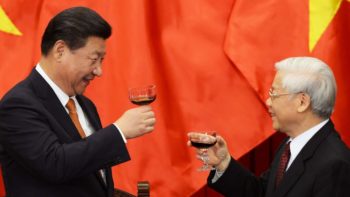
Vietnam and China agreed Monday to avoid conflicts in the hotly contested South China Sea, as a new pathway to dialogue on easing tensions was opened with other Southeast Asian nations.
The communist neighbours have long sparred over the sea, through which $5 trillion in shipping trade passes annually and which is believed to sit atop vast gas reserves.
Hanoi and Beijing agreed Monday to keep the peace in the sea, the countries said in a joint statement during a state visit to Hanoi by Chinese President Xi Jinping.
They agreed to “well manage disputes at sea, make no moves that may complicate or expand disputes, (and) maintain peace and stability on the East Sea,” the Vietnamese version of the statement said, using Hanoi’s term for the waters.
‘Better left untouched’: Philippines and Vietnam wary of Trump offer to mediate South China Sea disputes.
China claims nearly all of the sea, even approaching the coasts of its neighbours. It is also partly claimed by the Philippines, Malaysia, Brunei and Taiwan in addition to Vietnam.
China has in recent years built artificial islands and airstrips capable of hosting military installations in contested areas to cement its claims, inflaming tensions with its neighbours.
Relations between China and Vietnam hit a low in 2014 when Beijing moved an oil rig into waters claimed by Vietnam, sparking weeks of protests.
There have been two armed conflicts between China and Vietnam in the sea — brief clashes in 1974 and 1988 that claimed the lives of dozens of Vietnamese troops.
On Sunday US President Donald Trump offered to help Vietnam resolve the long-simmering tensions.
“If I can help mediate or arbitrate, please let me know… I am a very good mediator,” Trump said on his own state visit to Hanoi at the tail end of his marathon tour of Asia.
And China, which has long insisted the United States has no role to play in the dispute, spoke out against what it deemed foreign interference.
“We hope non-regional countries can respect the regional countries’ efforts in maintaining the regional stability of the South China Sea, and play a constructive role in this aspect,” foreign ministry spokesman Geng Shuang said at a regular press briefing in Beijing.
Trump was in Manila on Monday for meetings with the 10-member Association of Southeast Asian Nations (ASEAN) and several other countries.
At that meeting China and ASEAN, which includes Vietnam, announced on Monday night they had agreed to begin talks on a much-delayed code of conduct for the sea.
Copyright Ships & Ports Ltd. Permission to use quotations from this article is granted subject to appropriate credit given to www.shipsandports.com.ng as the source.